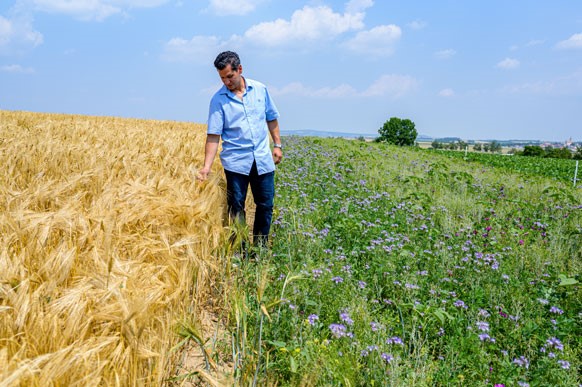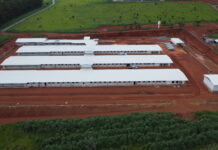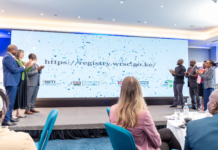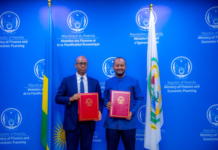
Flower strips at this Bayer Forward Farm offer habitats for insects in the field and are one of many sustainability and biodiversity measures in agriculture.
As part of the company’s Future of Farming Dialogue virtual event series, Liam Condon, President of the Crop Science division of Bayer, emphasized the importance of the company’s sustainability commitments it set in 2019. Condon addressed how the impact of COVID-19 and the resulting economic instability reinforced the need to intensify the focus on agricultural innovation and help make agriculture part of the solution to climate change, while continuing to ensure food security for all.
“The agricultural industry is no stranger to adversity – from flooding to drought to pest infestations – and COVID-19 is yet another stark reminder of the need to create a more sustainable and resilient food system to ensure food security,” said Condon. “Innovation, science and collaboration are key to not only solving the pandemic but also necessary in agriculture to solve the present and future challenges facing farmers.”
The Future of Farming Dialogue features a variety of internationally renowned speakers and stakeholders from academia, industry and media. The focus of discussion is how to build more resilient food systems, accelerate sustainable-driven innovations and develop new business models that can reward farmers for their services to the ecosystem.
Condon commented on Bayer’s sustainability commitments: “Especially in challenging times, it’s our responsibility to help ensure food security and reduce our environmental footprint. We also need to help farmers do the same by providing the products, services and technologies needed to produce enough food while using less resources and caring for the environment. The key to this is innovation and this is what we continue to drive forward.”
To underscore this, the company recently launched products and initiatives that highlight its commitment to agricultural innovation and digitalization, critical levers in driving a more sustainable food system. This includes:
· An industry-first, externally developed model that can measure the environmental impact of any crop protection product in any crop around the world. So far, the company has used this model to screen its entire portfolio and its uses around the world to understand the sustainability implications.
· The launch of the Bayer Carbon Initiative to help growers generate revenue for adopting specific climate-smart practices. Bayer is paving the way towards a carbon-zero future for agriculture through this innovative, science-based and collaborative pilot program with the potential to deliver unmatched value to many more farmers through expansion in the U.S. and Brazil and other world regions.
· The recent introduction of a new short stature corn product in Mexico, known as VITALA. The VITALA system consists of a new hybrid maize and best practices in agronomy to help farmers in Mexico grow more using less resources. Bayer is continuing to research and conduct trials with the goal of introducing region-specific varieties in other markets that will allow farmers around the world to experience the same benefits.
· The ‘Better Life Farming Alliance’, an initiative led by Bayer to empower smallholder farming communities. Together with partners, this alliance provides, know-how, inputs, financial solutions and market access to them. This year saw the expansion of support to Indonesia and Bangladesh and new banking services in India. Bayer also provided seeds and crop protection inputs along with market assistance and support for health and safety needs due to COVID-19 for smallholder farmers in Asia, Africa and Latin America. Better Life Farming is also testing and implementing gender-smart approaches and creating new job opportunities for youth.
These efforts – on top of many others – are already helping Bayer fulfill its commitments to empower 100 million smallholder farmers through access, agronomic knowledge, tools and partnerships; reduce field greenhouse gas emissions produced by key crops in major agricultural markets by 30 percent; and reduce the environmental impact of crop protection 30 percent by 2030. For more updates on how Bayer will continue to partner with key stakeholders to advance its sustainability commitments, visit the Bayer Sustainability Hub.
“By integrating sustainability into our core business, we are able to not only help ensure food security, but also transform agriculture so that it can become part of the solution for climate change,” added Condon.
Bayer will continue to host its Future of Farming Dialogue in a virtual series throughout 2020 and into 2021. Learn more here.








“Caring for the environment” , “Sustainability and biodiversity measures” by Bayer? How cynical…! Bayer is the owner of Monsanto and with its glyphosat products, directly responsible for environmental degradation and the death of billions of insects and bees.
The above article is a prime example of corporate white washing. Not more, not less.
Comments are closed.